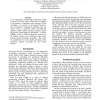Free Online Productivity Tools
i2Speak
i2Symbol
i2OCR
iTex2Img
iWeb2Print
iWeb2Shot
i2Type
iPdf2Split
iPdf2Merge
i2Bopomofo
i2Arabic
i2Style
i2Image
i2PDF
iLatex2Rtf
Sci2ools
106
click to vote
AAAI
2000
2000
Applying Learnable Evolution Model to Heat Exchanger Design
A new approach to evolutionary computation, called Learnable Evolution Model (LEM), has been applied to the problem of optimizing tube structures of heat exchangers. In contrast to conventional Darwiniantype evolutionary computation algorithms that use various forms of mutation and/or recombination operators, LEM employs machine learning to guide the process of generating new individuals. A system, ISHED1, based on LEM, automatically searches for the highest capacity heat exchangers under given technical and environmental constraints. The results of experiments have been highly promising, often producing solutions exceeding the best human designs.
AAAI 2000 | Evolutionary Computation | Evolutionary Computation Algorithms | Heat Exchangers | Intelligent Agents |
Related Content
| Added | 01 Nov 2010 |
| Updated | 01 Nov 2010 |
| Type | Conference |
| Year | 2000 |
| Where | AAAI |
| Authors | Kenneth A. Kaufman, Ryszard S. Michalski |
Comments (0)

